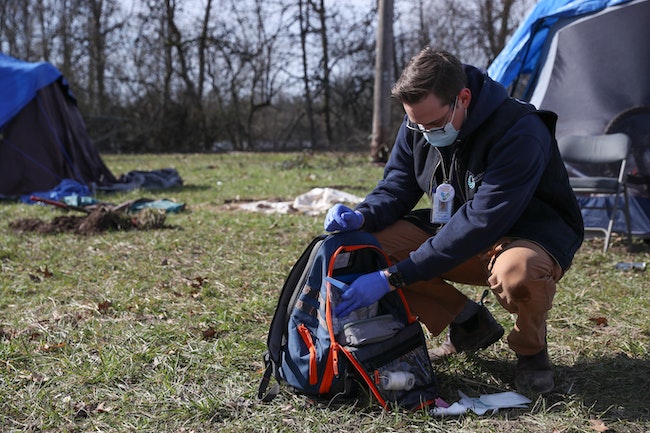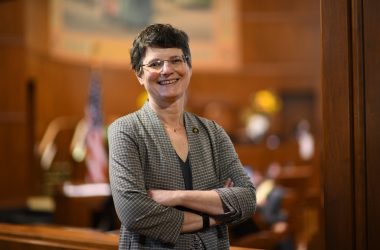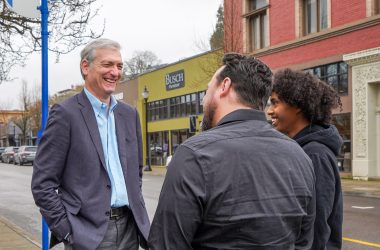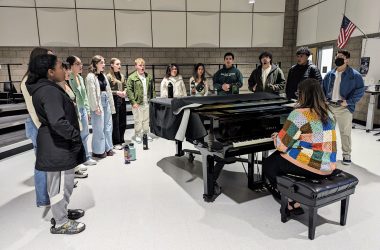
Kevin Holloway, a nurse with Northwest Human Services, unloads medical supplies to treat an injury while conducting medical outreach at Cascades Gateway City Park on March 2, 2021. (Amanda Loman/Salem Reporter)
As Jean Hendron climbed the flight of stairs to a Salem motel on the edge of town, she had a feeling she might find Brian Jackman dead.
The night before, she brought him a strawberry milkshake in her routine of regularly checking on him.
“I’ll be back before you have to pay for your room,” she told him before she left for the night.
Her fear gripped her several times over the previous eight months.
Before she slipped the key into the blue door, she knocked, as she had always done when she went to check on Jackman at the various motels he had stayed in on and off over the past year.
When she walked in that February morning, the sounds of cars traveling along Interstate 5 whirred in the distance. Jackman was lying on the bed closest to the window, one foot completely blackened, the other leg amputated from an earlier operation.
The 58-year-old had died sometime in the night.
Hendron doesn’t work for the government or a social service agency. She took it as a personal duty to help the troubled Jackman, worrying deeply at times about where in Salem he was.
Jackman is one of 30 people who had lived on the streets in the Salem area who died in the past 14 months, according to anecdotal accounts. There’s no exact counting because the Oregon Health Authority doesn’t track homeless deaths.
The account of Jackman’s last months reveals the struggles in Salem unhoused people and systems to care for such individuals face. Salem Reporter pieced this account together from interviews, medical records and court records.
Last year was particularly hard on unsheltered people as they were shuffled into city parks to limit the spread of Covid, tucked away from general public view as well.
They lost access to services as day rooms limited occupants and doctors moved to telemedicine. One of the city’s largest homeless service providers, the Mid-Willamette Valley Community Action Agency, spent millions to ensure people who were already housed could cover rent to avoid becoming homeless.
Millions more have been spent on short-term fixes. The city in November allocated nearly $800,000 for sheltering to address the problem, putting $350,000 toward a temporary shelter at the Oregon State Fairgrounds for two months and spending tens of thousands to clean up camps that have been allowed at Wallace Marine Park and Cascades Gateway Park, where around 600 people are living.
Community Action now spends $10,000 a day paying for motel rooms for unhoused people who are medically vulnerable.
To address longer-term needs, the Salem Housing Authority in August opened the city’s first permanent supportive housing project which pulled 35 chronically homeless people off the street. But the agency has struggled to get landlords to sign on to the Homeless Rental Assistant Program, which currently houses 67 people, during the eviction moratorium in place. There are another 77 seeking placement.
The pandemic has wrought an explosion in health problems in a group of people who already experience chronic health conditions at a higher rate.
Providers are anecdotally seeing the worst cases of things like trench foot, a type of foot damage from prolonged exposure to cold, damp and unsanitary conditions causing feet to swell and smell like decay.
 Kevin Holloway, a nurse with Northwest Human Services, checks the blood pressure of Tanja Whitemire at her camp in Cascades Gateway City Park on March 2, 2021. (Amanda Loman/Salem Reporter)
Kevin Holloway, a nurse with Northwest Human Services, checks the blood pressure of Tanja Whitemire at her camp in Cascades Gateway City Park on March 2, 2021. (Amanda Loman/Salem Reporter)
Scourge of amputations
Kevin Holloway, a nurse on the care team at Northwest Human Services West Salem Clinic, said when he goes out into Cascades Gateway or Wallace Marine parks, he’s triaging to watch for a medical emergency. He can treat minor wounds like cuts or scrapes, but otherwise he’s trying to get people to go to a medical provider at the clinic or the Homeless Outreach and Advocacy Project.
Holloway’s visits to the parks are a recent addition to Northwest Human Services, brought in the last year to address the ever-increasing health needs of those living outdoors in Salem.
He said amputations are common and many people have chronic health conditions like congestive heart failure, diabetes, or syphilis.
“Those foot amputations, I see that all the time,” he said. “It’s kind of a real scourge.”
People have their toes or feet amputated after frostbite leads to gangrene, which can cause nerve damage and kill the tissue.
Medical providers come to HOAP the first three Wednesdays of the month, and Holloway and outreach case manager Peter Buekea also offer bus rides for those who wouldn’t otherwise make it. The medical bus also transports people to the West Salem Clinic.
“As much as we see a need for medical attention, if they don’t want it then we can’t force them to,” Holloway said.
He knows of at least three clients who have died in the last year. Jackman was one.
Covid has cut off access to services
Ashley Hamilton, ARCHES program director, said her agency collects data on frequent users of emergency medical service, a self-reported number of how often people use the emergency room, have overnight hospital stays or ambulances within a 6-month period.
Her agency has been collecting data since 2017 and the score skyrocketed last year. The average used to be two, meaning most people used emergency services two times in six months. Last year the average score was nine.
The top 2% — 23 people — needed publicly paid emergency services 883 times in 2020, up from 500 the year prior, she said.
“People have just lost any connectivity to the service network. It’s just gone,” Hamilton said. “And so they’re just getting to these deteriorated states that now once we do find them they’re in such chronic condition.”
The ARCHES Project day center once hosted 150 people per day but now sees an average of 44 with Covid limits. HOAP used to see 60 to 160 people come through the doors from 9 a.m. to 2 p.m. at its day center in downtown. Now, the limit is less than 10.
There they could connect with the care management team and other social service providers like Northwest Human Services or Marion County Health and Human Services.
“There was a level of connectivity just having services open,” Hamilton said “That’s just singular to ARCHES, so losing that connectivity was a real loss to those referrals. They lost the advocate that they used to have or the level of advocacy that they used to have.”
Brian Jackman under an eave at Rite Aid in December 2019 describing his medical conditions. (Courtesy/ Jean Hendron)
Charcoal briquettes
No stranger to many advocates with his outgoing, combative and loquacious personality, Jackman shuffled from downtown, to the park, to motels in the last year of his life.
Born in Pennsylvania and raised in San Jose, California, Jackman made his way to Oregon around 2003.
He was released from prison in September 2019 after serving 7 and a half years for stealing a handful of DVDs from a Goodwill and Safeway in Salem and attempting to stab a security guard in the leg with an X-acto knife who confronted him.
The year after he was released from prison, he went to the hospital 40 times, his mother, Dawn Jackman said.
His medical problems are documented in his chart from Salem Health: diabetes, neuropathy, bipolar disorder, heart failure, heart murmur, HPV, hepatitis, hypertension, substance abuse.
Many advocates were surprised he lived as long as he did.
Hendron met Jackman as he was living under eaves in front of Rite Aid in December 2019. In a video she took of him, the 6-foot-2 Jackman pulled off his boot and sock, revealing two toes blackened from frostbite.
Dawn Jackman described his toes as “little charcoal briquettes.”
 Brian Jackman after he got out of prison in 2019. (Courtesy/Dawn Jackman)
Brian Jackman after he got out of prison in 2019. (Courtesy/Dawn Jackman)
‘He has risen, like the Phoenix’
Hendron worried Jackman wouldn’t make it out of the hospital alive in June. On June 20, he needed intensive care because he was in septic shock.
He arrived at the hospital by ambulance the day before, because his right foot, where his toes had been amputated following the frostbite, was in pain.
Two and a half weeks later, he was discharged, heading for a motel.
“Despite aggressive attempts to place the patient to some means of housing versus structured facility, due to his psychosocial history unfortunately these attempts were not (successful),” his medical chart reads.
Jackman borrowed a phone from a motel guest and called Hendron for help. She found him lying on the ground unable to get up in front of a reception window at the motel. She pulled his wheelchair out of her car and Jackman struggled to get seated.
“Everything that transpired tells me that Brian has chosen to die, and I doubt I will find him alive, in the morning, but he has risen, like the Phoenix, so many times. Most of all, I do not want him to die alone, so I am crying,” Hendron wrote on her Facebook on July 10.
That week, Hendron set about finding Jackman a tent and a camping spot in Wallace Marine Park, bringing him blankets, food and clothing.
Days went by where she couldn’t find or get ahold of him because he didn’t have a working phone. The only guarantee of a phone call was if he was in the hospital.
With limited ability to get around, he relied on friends to help.
Jackman had a spacious eight-person tent that fit his wheelchair, a mattress and some plastic storage drawers.
When he left his tent to get food, he would hobble on his good leg and push his wheelchair in front of him across the pedestrian bridge over the Willamette River to cover the half mile to The ARCHES Project. Often, he would return to a rifled tent.
His morning regime included 12 medications, with another four at night. He worried his medications would get stolen.
When his insulin was stolen, Dawn Jackman said her son “would go sky high.” His blood sugar levels would spike to a dangerous level and he told her his mind was foggy.
He was in the hospital again in September. Another portion of his right leg was amputated, and he was discharged to the street. He was in the hospital again just before Halloween.
“He was frustrated with the system,” Dawn Jackman said. “He said: ‘I feel like a damn ping pong ball.’”
She said it was difficult for her son to keep his wound clean on the street. He was using a bucket to go to the bathroom in his tent, and someone once spilled it.
“He was mad about that because he was trying hard to keep clean,” she said.
He got a MRSA infection, an antibiotic-resistant type of bacteria that causes a skin infection and can cause tissue damage and organ failure if untreated. Then he had a heart attack because of a blood clot in his heart. Then kidney failure, Dawn Jackman said.
In early November, Jackman’s SNAP benefits, ID and government benefits card were stolen while he was living in a tent. Hendron and others brought him food, or he would make the trek to ARCHES for a meal.
Christmas landed Jackman back in the emergency room, with someone taking his unattended tent as he went in.
The Kindness Closet, a nonprofit that helps unsheltered people, got Jackman another tent over the holiday after he was discharged again.
Five days before Jackman’s birthday on Jan. 29, he got a temporary ID card and worked to replace his government benefits card, now gone three months.
By that time, it was too painful for him to put a shoe on his one remaining foot, and he couldn’t stand on it. He was too stiff to reach back to put a jacket on.
“It’s his birthday Friday. I’m hoping something wonderful will happen. It’s so hard to know what ‘wonderful’ means, under Brian’s circumstances. It could be something totally different than what I might assume,” Hendron wrote on Facebook Jan. 27.
On his birthday, Hendron brought Jackman a book about reptiles to his tent situated along a walking path in Wallace Marine Park.
When he got his government benefits card, he could again afford a motel room. Less than two weeks after his birthday, Hendron found Jackman dead.
Dawn Jackman intends to have a service for her son in July, continuing a family tradition of getting black balloons and tying a message to the string with feelings about the person before letting the balloon go.
Services failed Brian
Jimmy Jones, executive director of the Mid-Willamette Valley Community Action Agency, said services in Salem failed Jackman.
He said the question for the community is whether cases like Jackman’s, people who are truly the hardest to house, are beyond the scope of any one agency.
“People out there with need levels and acuity so high that there’s just no resources in place,” Jones said.
He said Jackman needed a place where he could get respite care but “that just wasn’t available for Brian.”
ARCHES would place Jackman in a motel, only for him to get kicked out later on. Then, they would try a different motel.
Jones said he doesn’t know the specific reason Jackman was kicked out but commonly people are asked to leave if they invite friends over and are using illegal drugs.
“There’s this revolving door of people going from hospital, tent to motel back to hospital. It just goes on and on and on until eventually he passes away,” Jones said.
He said homelessness like Jackman’s is a public health issue for Salem, not a social one.
“It’s really not a question of whether or not housing is available. It’s the simple and final analysis that Brian was going to die if someone did not put him inside and keep him inside,” Jones said. “He played a role in that not being possible.”
Jones turns to the Bible parable of Cain, who killed his brother Abel out of jealousy.
When God asks where Abel is, Cain replies, “I don’t know. Am I my brother’s keeper?”
In other words, he’s not my problem, Jones surmised.
In fact, Jones said, such people “are collectively the community’s responsibility.”
Correction: An earlier version of this story misspelled Abel of the Bible story.
Contact reporter Saphara Harrell at 503-549-6250, [email protected].
Salem Reporter counts on community support to fund vital local journalism. You can help us do more.
SUBSCRIBE: A monthly digital subscription starts at $5 a month.
GIFT: Give someone you know a subscription.
ONE-TIME PAYMENT: Contribute, knowing your support goes towards more local journalism you can trust.









